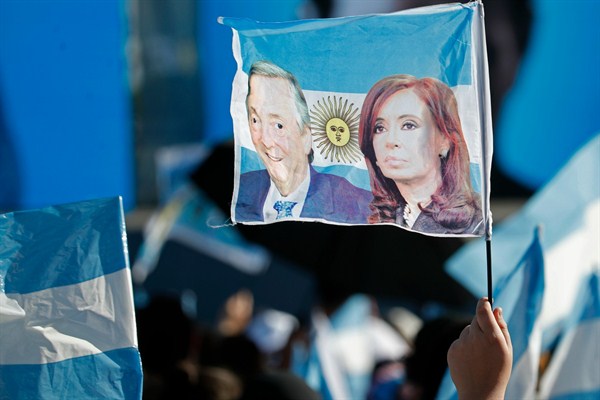Argentina will hold a general election Sunday, but a struggling economy means the odds are stacked heavily against incumbent President Mauricio Macri. One out of 10 working-age Argentines are unemployed, and the annual inflation rate stands at more than 50 percent. GDP contracted by 2.5 percent in 2018 and by another 2.5 percent during the first half of this year. Macri’s best hope is to force a runoff, but opposition presidential candidate Alberto Fernandez and his running mate, former President Cristina Fernandez, look likely to win outright in the first round of voting.
This is not the first economic crisis for Argentina. For those who lived through the depression of the late 1990s and early 2000s, the country’s current situation must seem eerily familiar, if less severe. To discuss the reasons why the country is so prone to economic instability, WPR’s Elliot Waldman is joined by Luciano Cohan, a Buenos Aires-based economist and consultant who recently served as undersecretary of macroeconomic policy at Argentina’s Ministry of Finance. They also talk about how the political uncertainty surrounding the election outcome—particularly, which of the two Fernandezes will actually govern should they win as expected—is making Argentina’s economic woes more difficult to resolve.
If you like what you hear on Trend Lines and what you’ve read on WPR, you can sign up for our free newsletter to get our uncompromising analysis delivered straight to your inbox. The newsletter offers a free preview article every day of the week, plus three more complimentary articles in our weekly roundup every Friday. Sign up here. Then subscribe.
Listen:
Download: MP3
Subscribe: iTunes | RSS | Spotify
Relevant Articles on WPR:
Fear of Fernandez’s Return Should Be Helping Argentina’s Macri. It’s Not
Will Cristina Fernandez’s Surprise Political Ploy Work in Argentina?
Macri Tries to Weather Argentina’s Economic Storm by Ending ‘Gradualismo’
Argentina Is Getting Impatient With Macri’s Painful Economic Reforms
Trend Lines is produced and edited by Peter Dörrie, a freelance journalist and analyst focusing on security and resource politics in Africa. You can follow him on Twitter at @peterdoerrie.
To send feedback or questions, email us at podcast@worldpoliticsreview.com.

